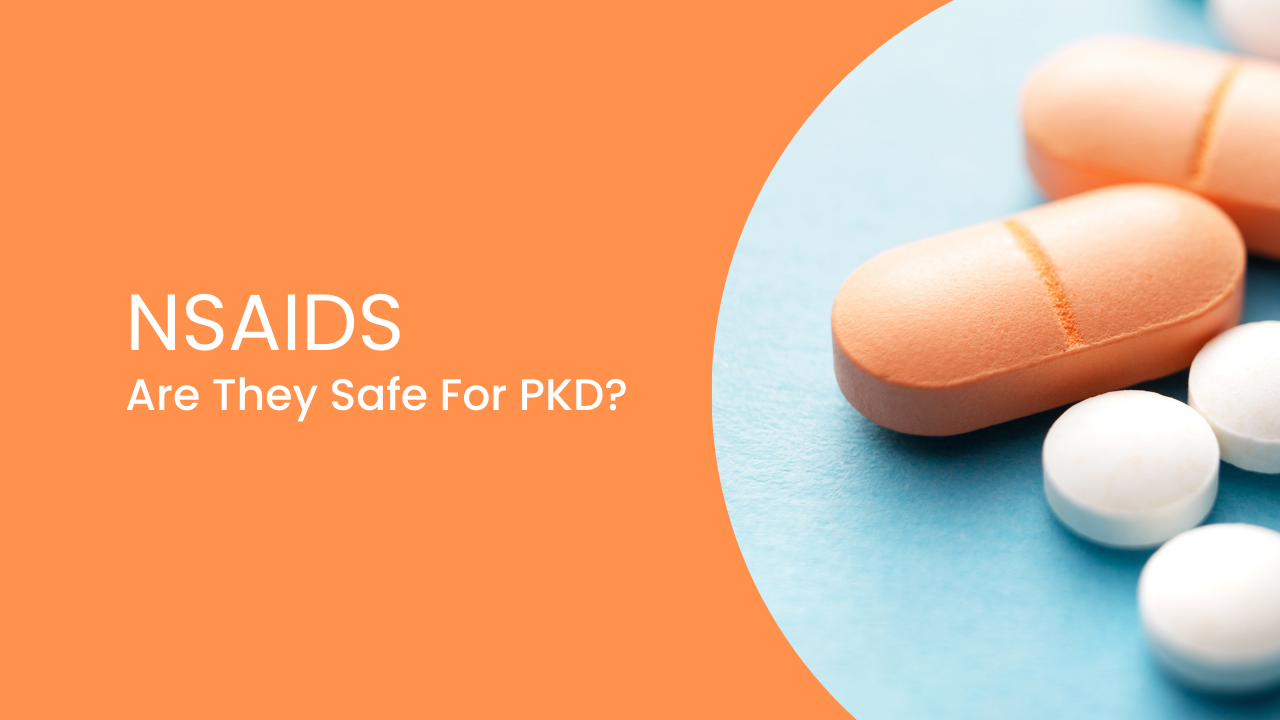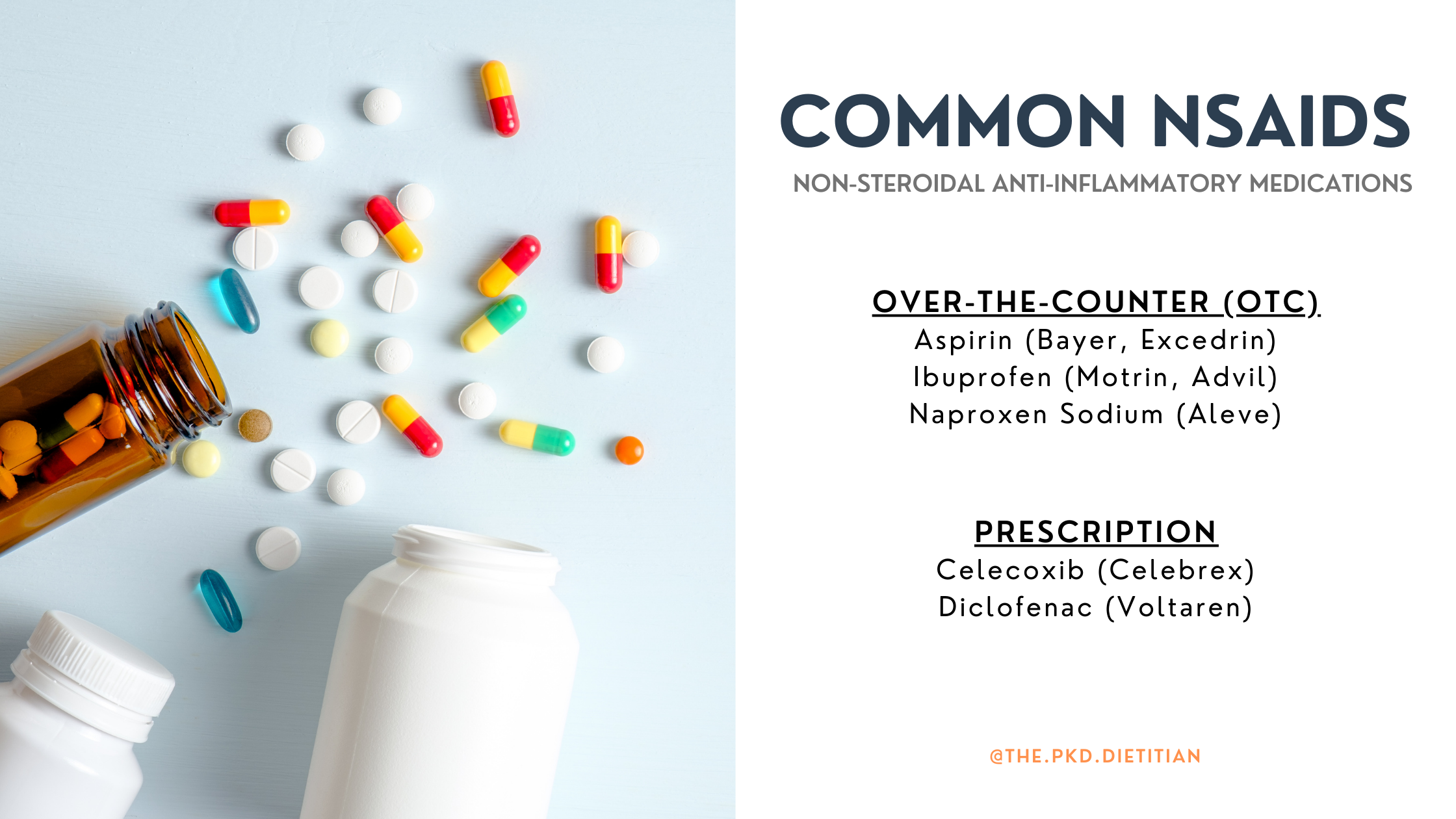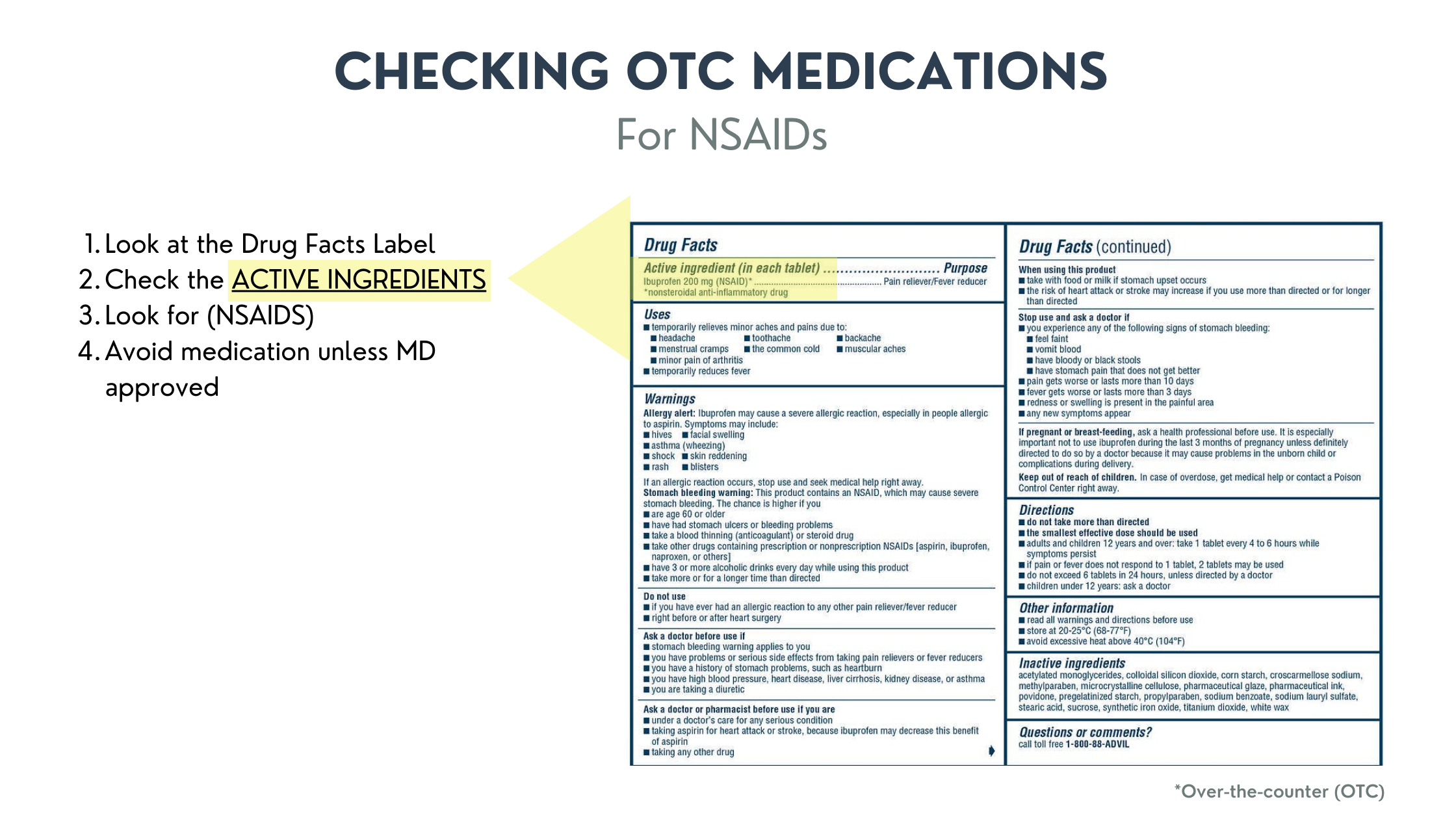
NSAIDs, Are They Safe For Polycystic Kidney Disease?
Jan 18, 2023One question I always ask folks I work with is “do you have any pain or discomfort” that you associate with your kidneys? I have learned so much about what it is like living with PKD from this single question. While this isn’t specifically a nutrition topic, it for sure is a proactive PKD discussion.
My first question for you is, what do you take to combat or help with pain that is related to PKD, or not? Perhaps you have been told not to use NSAIDS? I bet a lot of you have heard that from your MDs and Healthcare providers.
My second question for you is do you know why you are advised to avoid NSAIDs with Polycystic Kidney Disease? That's just what we are going to do, look a bit deeper at what is driving the recommendations around NSAIDs. We will look at what NSAIDS are, why you are told to avoid them with PKD, and what to do next.
What Are NSAIDs?
NSAIDs is the commonly used abbreviation for “Nonsteroidal Anti-Inflammatory Drugs” which are a class of medication, typically purchased over-the-counter (OTC). They are taken for pain relief, to reduce inflammation, to reduce a fever, and for their blood thinning properties.
The NSAIDs you are most likely familiar with are the OTC medications. Common Names for them are:
- Aspirin (Bayer, Excedrin)
- Ibuprofen (Motrin, Advil)
- Naproxen (Aleve)
There are also prescription-strength NSAIDs. Prescribed, for example, for migraines, RA, and back pain. (1) Two commonly prescribed examples are Celebrex and Voltaren. (2) If you have ever taken any of these meds, you have taken an NSAID.
Your MD might have told you to take low-dose aspirin to help protect against heart disease, cardiovascular disease (CVD). (3) Low-dose aspirin, commonly referred to as baby aspirin, is technically an NSAID. However, it is considered safe for use with impaired kidney function because it is a much lower dose than what is used for pain control. It does not have the same negative effects on the kidneys.
In general, the use of low-dose aspirin, up to 100 mg daily, is considered safe even with reduced kidney function. (4,5) As always, talk with your MD about YOUR specific needs, conditions, and other medications before starting any new OTC medication.
Why Are You Told To Avoid NSAIDs?
First and foremost, they can reduce blood flow to the kidneys. Non-steroidal anti-inflammatory drugs’ main course of action is to inhibit specific enzymes in the body. They are known as Cox-1 and Cox-2 enzymes. (6) You don’t need to know or even remember those names, just that these enzymes play a role in how blood flows in your kidneys.
Simply put, if you inhibit these enzymes you also inhibit kidney blood flood. That folks is something you for sure don’t want to do! Blood carries oxygen to all parts of your body. Reducing blood flow to your kidneys also reduces the amount of oxygen they are getting. Reduced oxygen can lead to direct damage to the kidneys and to loss of function.
Blocking of the Cox-1 and COX-2 enzymes can also disrupt the balance of many functions of the kidneys. (7) Remember, your kidneys are filters that clean out your blood, remove waste, and help to regulate your blood pressure (BP). NSAID use, especially long-term use, can interfere with all of that including causing additional kidney damage. (8) Along with decreased blood flow to the kidneys, NSAIDs can:
- Cause high blood pressure
- Increased sodium and fluid retention
- Increase already high BP
- interact with and prevent some blood pressure meds from working correctly
With CKD, NSAID use has been clinically associated with:
- Acute Kidney Injury (AKI). Especially if an individual’s blood pressure (BP) is low and they are dehydrated.
- Faster progression of kidney disease and decline in function.
- An increase in blood pressure!
If you are unsure if the over-the-counter (OTC) medication you rely on is an NSAID, ask your pharmacist or healthcare provider. They will be able to clarify it for you and let you know if they are safe to use. You also can look for NSAIDs on the Drug Facts Label, it will document if an NSAID is one of the active ingredients. For more on how to read Drug Labels, check out this comprehensive article.
It is especially important to look at any cold or sinus medications because Non-Steroidal Anti-Inflammatory Meds (NSAIDs) are often an included ingredient. A great resource to bookmark is the NIH's searchable index of Drug Facts Labels called DailyMed.
*Example of a Drug Facts label, brand name Aleve.
Skip NSAIDS With PKD
In addition to reducing blood flow to the kidneys, NSAIDS can interact with, and lower, the effectiveness of several medications frequently prescribed to help treat high blood pressure (BP) with PKD.
Those blood pressure meds include:
- ACE inhibitors, e.g. Lisinopril (Zestril)
- ARBs, e.g. Losartan (Cozaar)
- Some Diuretics “water pills”, e.g. Hydrochlorothiazide (HCTZ)
The combination of an ACE inhibitor or an ARB + HCTZ + an NSAID is even more dangerous because of an elevated risk of kidney damage. There is a greater risk of low BP, dehydration, and less blood flow to the kidneys.
General PKD Recommendations
NSAIDs are not recommended to treat chronic pain and for long-term use with PKD. You want to avoid taking them unless your MD has prescribed them, or given you the green light for specific use. You may want to ask about some short-term situations, so ask before using them. As always, talk with your MD. You can start that conversation and ask about the risk vs. benefit for you.
Now, the question is, what can you use? Acetaminophen (Tylenol) has been used, and recommended, as a first-line pain medication for well over 50 years and is considered safe for people with altered kidney function. (9)
It is also recommended by the National Kidney Foundation, and PKD Foundation, as the first pain relief med of choice for folks with kidney disease, including PKD. (10) With regards to PKD, there is no evidence acetaminophen (Tylenol) can and will injure your kidneys or liver, including with PLD. (11)
Remember that each individual’s health is different, so a medication that’s right for someone else may not be suitable for you. If you have chronic kidney disease or another health condition, such as heart disease, you should always consult with your physician and nephrologist before taking medications.
Key Takeaways
- High doses or long-term use of NSAIDs can cause kidney damage
- NSAIDs can reduce the blood flow to your kidneys
- Always check the ingredients in your medications
- Don’t use over-the-counter NSAIDs with PKD
- Talk with your MD if you need or want to take NSAIDs, for a specific use
I did a podcast episode on the topic of NSAIDs and PKD. Make sure to follow The PKD Dietitian Podcast wherever you listen! Check it out >>> Episode #10 of The PKD Dietitian Podcast
Enjoy!
Diana, The PKD Dietitian




